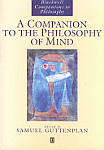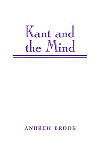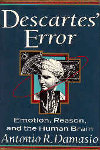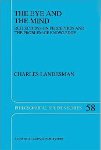Books on consciousness
A list of books relating to the hard problem of consciousness. Regularly updated cos I keep finding new stuff all the time.
A list of books relating to the hard problem of consciousness. Regularly updated cos I keep finding new stuff all the time.
1994
 Barbara Hannan
Barbara Hannan
Subjectivity And Reduction: An Introduction To The Mind-body Problem
(Westview Press 1994)
Contemporary philosophy has seen a proliferation of complex theories and intricate arguments brought to bear on the mind-body problem, perhaps the most intractable of perennial philosophical problems. In this concise and accessible text, Barbara Hannan provides an elegant introduction to this contemporary debate. See Amazon | Google
 Samuel Guttenplan (ed.)
Samuel Guttenplan (ed.)
A Companion to the Philosophy of Mind
(Blackwell 1994)
The philosophy of mind is one of the fastest-growing areas in philosophy, not least because of its connections with related areas of psychology, linguistics and computation. This companion is an alphabetically arranged reference guide to the subject, firmly rooted in the philosophy of mind, but with a number of entries that survey adjacent fields of interest. See Amazon | Google
 Karl Popper (edited by M. A. Notturno)
Karl Popper (edited by M. A. Notturno)
Knowledge and the Body-Mind Problem: In Defence of Interaction
(Routledge 1994)
The following chapters are based upon lectures that I delivered at Emory University in 1969 on the body-mind problem. In them, I suggest a theory of mind-body interaction that I relate to evolutionary emergence, human language, and what I have, since the mid-1960s, called ‘world 3.’ See Amazon | Google
 Andrew Brook
Andrew Brook
Kant and the Mind
(Cambridge 1994)
Kant made a number of highly original discoveries about the mind - about its ability to synthesise a single, coherent representation of self and world, about the unity it must have to do so, and about the mind's awareness of itself and the semantic apparatus it uses to achieve this awareness. The past fifty years have seen intense activity in research on human cognition. Even so, Kant's discoveries have not been superseded, and some of them have not even been assimilated into current thinking. See Cambridge | Amazon | Google
 L. Nathan Oaklander & Quentin Smith (eds.)
L. Nathan Oaklander & Quentin Smith (eds.)
The New Theory of Time
(Yale 1994)
The most important debate between 20th-century philosophers of time has been whether events that have happened, are happening, or will happen are equally real (the tenseless theory) or whether there is a fundamental distinction between past, present, and future, with only present events possessing full existence (the tensed theory). In the 1980s a new version of the tenseless theory emerged. While advocates still posit that all events are equally real, they depart from the old tenseless theory by conceding that tensed expressions cannot be translated into tenseless ones, and support their view using other arguments. This anthology offers the latest turns in the debate. See Yale | Amazon | Google
 Leen Spruit
Leen Spruit
Species Intelligibilis: From Perception to Knowledge. Vol. 1. Classical Roots and Medieval Discussions
(Brill 1994)
This study examines the history of a fundamental problem in Aristotelian cognitive psychology, viz., the nature and function of the mechanisms that provide the human mind with data concerning physical reality. Spruit traces the classical and Arabic prehistory of the medieval doctrine of intelligible species and analyzes Aquinas’s views on mental representation in the context of the reception of Peripatetic psychology. He then examines the controversies about the necessity of intelligible species from Aquinas’s death to the 15th century. See Brill | Amazon | Google
 John Campbell
John Campbell
Past, Space and Self
(MIT 1994)
Campbell shows that the general structural features of human thought can be seen as having their source in the distinctive ways in which we think about space and time. He discusses at length the relation between self-consciousness and the first person and how fundamental the first person is in ordinary thought. He also considers the metaphysical implications of this approach, in particular, how ordinary self-consciousness relies on a realist view of the past. See MIT Press | Google | Amazon
 Robert Kirk
Robert Kirk
Raw Feeling
(Oxford 1994)
How can processes in the brain amount to conscious experiences? Kirk uses the notion of “raw feeling” to bridge the intelligibility gap between thinking of ourselves as physical organisms and as subjects of experience. The task is to understand how the truth about raw feeling could be strictly implied by narrowly physical truths. Kirk offers a penetrating analysis and suggests novel solutions. See Oxford | Google
 Antonio Damasio
Antonio Damasio
Descartes’ Error: Emotion, Reason and the Human Brain
(Putnam 1994)
In the centuries since Descartes famously proclaimed, ‘I think, therefore I am,’ science has often overlooked emotions as the source of a person’s true being. In this wonderfully engaging book, Damasio takes us on a journey of scientific discovery through a series of case studies, demonstrating what many of us have long suspected: emotions are not a luxury, they are essential to rational thinking and to normal social behaviour. See Google (2008 revised edition)
 Roger Penrose
Roger Penrose
Shadows of the Mind: A Search for the Missing Science of Consciousness
(Oxford 1994)
Penrose mounts an even more powerful attack on artificial intelligence and points the way to a new science that may explain the physical basis of the human mind. Providing powerful arguments that the conscious brain transcends computation and cannot be explained by present-day science, Penrose introduces some new ideas that differ markedly from those advanced in his 1989 bestseller, The Emperor’s New Mind. With a remarkable excursion into microbiology, he contends that microtubules, and not neurons, may be the basic units of the conscious brain. See Oxford | Google
 R. Steven Turner
R. Steven Turner
In the Eye’s Mind: Vision and the Helmholtz-Hering Controversy
(Princeton 1994)
One of the most persistent controversies of modern science concerns human visual perception. It erupted in Germany during the 1860s as a dispute between physiologists Hermann von Helmholtz, Ewald Hering, and their schools. Well into the 20th century these groups warred over our capacity to perceive space, over the retinal mechanisms that mediate color sensations, and over the role of mind, experience, and inference in vision. Turner explores their impassioned exchanges both to illuminate the clash of theory and to explore the larger role of controversy in science. See Princeton | Google
 Charles Landesman
Charles Landesman
The Eye and the Mind: Reflections on Perception and the Problem of Knowledge
(Springer 1994)
This book explains our common-sense understanding of perception and defends a representative theory of perception as being in accord with the results of science. It also argues against color realism and defends the view that nothing has color. This view is color skepticism. A chapter is devoted to defending color skepticism against a number of objections. The book ends with a discussion of our concept of knowledge and attempts to show that the representative theory of perception is not as vulnerable to skeptical arguments as has been assumed. See Springer | Google | Amazon
 Galen Strawson
Galen Strawson
Mental Reality
(MIT 1994)
What is distinctive of the mental? Strawson argues that it is not intelligence, representational content, or intentionality broadly understood, but conscious experience. He argues that philosophy is still confused by positivism and its various offspring and gives undue primacy of place to non-mental phenomena in its account of the nature of mind. Strawson describes an alternative position, naturalized Cartesianism, that couples the materialist view that mind is entirely natural and wholly physical with respect for the idea that the only distinctively mental phenomena are those of conscious experience. See MIT Press | Google | Amazon
 Howard Robinson
Howard Robinson
Perception
(Routledge 1994)
This controversial but highly accessible introduction re-examines the notorious sense-datum theory of perception. Robinson surveys the history of the arguments for and against the theory from Descartes to Husserl and argues that we should return to the theory in order to understand perception. In doing so he seeks to overturn a consensus that has dominated the philosophy of perception for nearly half a century. See Routledge | Google | Amazon
 Francis Crick
Francis Crick
The Astonishing Hypothesis: The Scientific Search for the Soul
(Scribner 1994)
Francis Crick turns his attention to human consciousness and maps out the neurobiology of vision. The result is a cogent, witty, and richly detailed analysis of how the brain “sees,” and a daring exploration of some of the most fundamental questions of human existence – Do we have free will? What makes us sentient beings and different from other animals? Is there such a thing as a soul, or are we nothing more than a complex collection of neurons? See Amazon | Google
 A. Revonsuo & M. Kamppinen (eds.)
A. Revonsuo & M. Kamppinen (eds.)
Consciousness in Philosophy and Cognitive Neuroscience
(Psychology Press 1994)
This volume presents the thoughts of some of the leading philosophers and cognitive scientists who participated in the discussion of the status of consciousness in science – International Symposium of Consciousness, University of Turku 1992. The focus of inquiry was the question, “Is it possible to incorporate consciousness into science?” See Psychology Press | Google

Subjectivity And Reduction: An Introduction To The Mind-body Problem
(Westview Press 1994)
Contemporary philosophy has seen a proliferation of complex theories and intricate arguments brought to bear on the mind-body problem, perhaps the most intractable of perennial philosophical problems. In this concise and accessible text, Barbara Hannan provides an elegant introduction to this contemporary debate. See Amazon | Google

A Companion to the Philosophy of Mind
(Blackwell 1994)
The philosophy of mind is one of the fastest-growing areas in philosophy, not least because of its connections with related areas of psychology, linguistics and computation. This companion is an alphabetically arranged reference guide to the subject, firmly rooted in the philosophy of mind, but with a number of entries that survey adjacent fields of interest. See Amazon | Google

Knowledge and the Body-Mind Problem: In Defence of Interaction
(Routledge 1994)
The following chapters are based upon lectures that I delivered at Emory University in 1969 on the body-mind problem. In them, I suggest a theory of mind-body interaction that I relate to evolutionary emergence, human language, and what I have, since the mid-1960s, called ‘world 3.’ See Amazon | Google

Kant and the Mind
(Cambridge 1994)
Kant made a number of highly original discoveries about the mind - about its ability to synthesise a single, coherent representation of self and world, about the unity it must have to do so, and about the mind's awareness of itself and the semantic apparatus it uses to achieve this awareness. The past fifty years have seen intense activity in research on human cognition. Even so, Kant's discoveries have not been superseded, and some of them have not even been assimilated into current thinking. See Cambridge | Amazon | Google

The New Theory of Time
(Yale 1994)
The most important debate between 20th-century philosophers of time has been whether events that have happened, are happening, or will happen are equally real (the tenseless theory) or whether there is a fundamental distinction between past, present, and future, with only present events possessing full existence (the tensed theory). In the 1980s a new version of the tenseless theory emerged. While advocates still posit that all events are equally real, they depart from the old tenseless theory by conceding that tensed expressions cannot be translated into tenseless ones, and support their view using other arguments. This anthology offers the latest turns in the debate. See Yale | Amazon | Google

Species Intelligibilis: From Perception to Knowledge. Vol. 1. Classical Roots and Medieval Discussions
(Brill 1994)
This study examines the history of a fundamental problem in Aristotelian cognitive psychology, viz., the nature and function of the mechanisms that provide the human mind with data concerning physical reality. Spruit traces the classical and Arabic prehistory of the medieval doctrine of intelligible species and analyzes Aquinas’s views on mental representation in the context of the reception of Peripatetic psychology. He then examines the controversies about the necessity of intelligible species from Aquinas’s death to the 15th century. See Brill | Amazon | Google

Past, Space and Self
(MIT 1994)

Campbell shows that the general structural features of human thought can be seen as having their source in the distinctive ways in which we think about space and time. He discusses at length the relation between self-consciousness and the first person and how fundamental the first person is in ordinary thought. He also considers the metaphysical implications of this approach, in particular, how ordinary self-consciousness relies on a realist view of the past. See MIT Press | Google | Amazon

Raw Feeling
(Oxford 1994)
How can processes in the brain amount to conscious experiences? Kirk uses the notion of “raw feeling” to bridge the intelligibility gap between thinking of ourselves as physical organisms and as subjects of experience. The task is to understand how the truth about raw feeling could be strictly implied by narrowly physical truths. Kirk offers a penetrating analysis and suggests novel solutions. See Oxford | Google

Descartes’ Error: Emotion, Reason and the Human Brain
(Putnam 1994)

In the centuries since Descartes famously proclaimed, ‘I think, therefore I am,’ science has often overlooked emotions as the source of a person’s true being. In this wonderfully engaging book, Damasio takes us on a journey of scientific discovery through a series of case studies, demonstrating what many of us have long suspected: emotions are not a luxury, they are essential to rational thinking and to normal social behaviour. See Google (2008 revised edition)

Shadows of the Mind: A Search for the Missing Science of Consciousness
(Oxford 1994)
Penrose mounts an even more powerful attack on artificial intelligence and points the way to a new science that may explain the physical basis of the human mind. Providing powerful arguments that the conscious brain transcends computation and cannot be explained by present-day science, Penrose introduces some new ideas that differ markedly from those advanced in his 1989 bestseller, The Emperor’s New Mind. With a remarkable excursion into microbiology, he contends that microtubules, and not neurons, may be the basic units of the conscious brain. See Oxford | Google

In the Eye’s Mind: Vision and the Helmholtz-Hering Controversy
(Princeton 1994)
One of the most persistent controversies of modern science concerns human visual perception. It erupted in Germany during the 1860s as a dispute between physiologists Hermann von Helmholtz, Ewald Hering, and their schools. Well into the 20th century these groups warred over our capacity to perceive space, over the retinal mechanisms that mediate color sensations, and over the role of mind, experience, and inference in vision. Turner explores their impassioned exchanges both to illuminate the clash of theory and to explore the larger role of controversy in science. See Princeton | Google

The Eye and the Mind: Reflections on Perception and the Problem of Knowledge
(Springer 1994)
This book explains our common-sense understanding of perception and defends a representative theory of perception as being in accord with the results of science. It also argues against color realism and defends the view that nothing has color. This view is color skepticism. A chapter is devoted to defending color skepticism against a number of objections. The book ends with a discussion of our concept of knowledge and attempts to show that the representative theory of perception is not as vulnerable to skeptical arguments as has been assumed. See Springer | Google | Amazon

Mental Reality
(MIT 1994)

What is distinctive of the mental? Strawson argues that it is not intelligence, representational content, or intentionality broadly understood, but conscious experience. He argues that philosophy is still confused by positivism and its various offspring and gives undue primacy of place to non-mental phenomena in its account of the nature of mind. Strawson describes an alternative position, naturalized Cartesianism, that couples the materialist view that mind is entirely natural and wholly physical with respect for the idea that the only distinctively mental phenomena are those of conscious experience. See MIT Press | Google | Amazon

Perception
(Routledge 1994)

This controversial but highly accessible introduction re-examines the notorious sense-datum theory of perception. Robinson surveys the history of the arguments for and against the theory from Descartes to Husserl and argues that we should return to the theory in order to understand perception. In doing so he seeks to overturn a consensus that has dominated the philosophy of perception for nearly half a century. See Routledge | Google | Amazon

The Astonishing Hypothesis: The Scientific Search for the Soul
(Scribner 1994)
Francis Crick turns his attention to human consciousness and maps out the neurobiology of vision. The result is a cogent, witty, and richly detailed analysis of how the brain “sees,” and a daring exploration of some of the most fundamental questions of human existence – Do we have free will? What makes us sentient beings and different from other animals? Is there such a thing as a soul, or are we nothing more than a complex collection of neurons? See Amazon | Google

Consciousness in Philosophy and Cognitive Neuroscience
(Psychology Press 1994)
This volume presents the thoughts of some of the leading philosophers and cognitive scientists who participated in the discussion of the status of consciousness in science – International Symposium of Consciousness, University of Turku 1992. The focus of inquiry was the question, “Is it possible to incorporate consciousness into science?” See Psychology Press | Google
Menu
 What’s a logical paradox?
What’s a logical paradox? Achilles & the tortoise
Achilles & the tortoise The surprise exam
The surprise exam Newcomb’s problem
Newcomb’s problem Newcomb’s problem (sassy version)
Newcomb’s problem (sassy version) Seeing and being
Seeing and being Logic test!
Logic test! Philosophers say the strangest things
Philosophers say the strangest things Favourite puzzles
Favourite puzzles Books on consciousness
Books on consciousness Philosophy videos
Philosophy videos Phinteresting
Phinteresting Philosopher biographies
Philosopher biographies Philosopher birthdays
Philosopher birthdays Draft
Draftbarang 2009-2024  wayback machine
wayback machine
 wayback machine
wayback machine